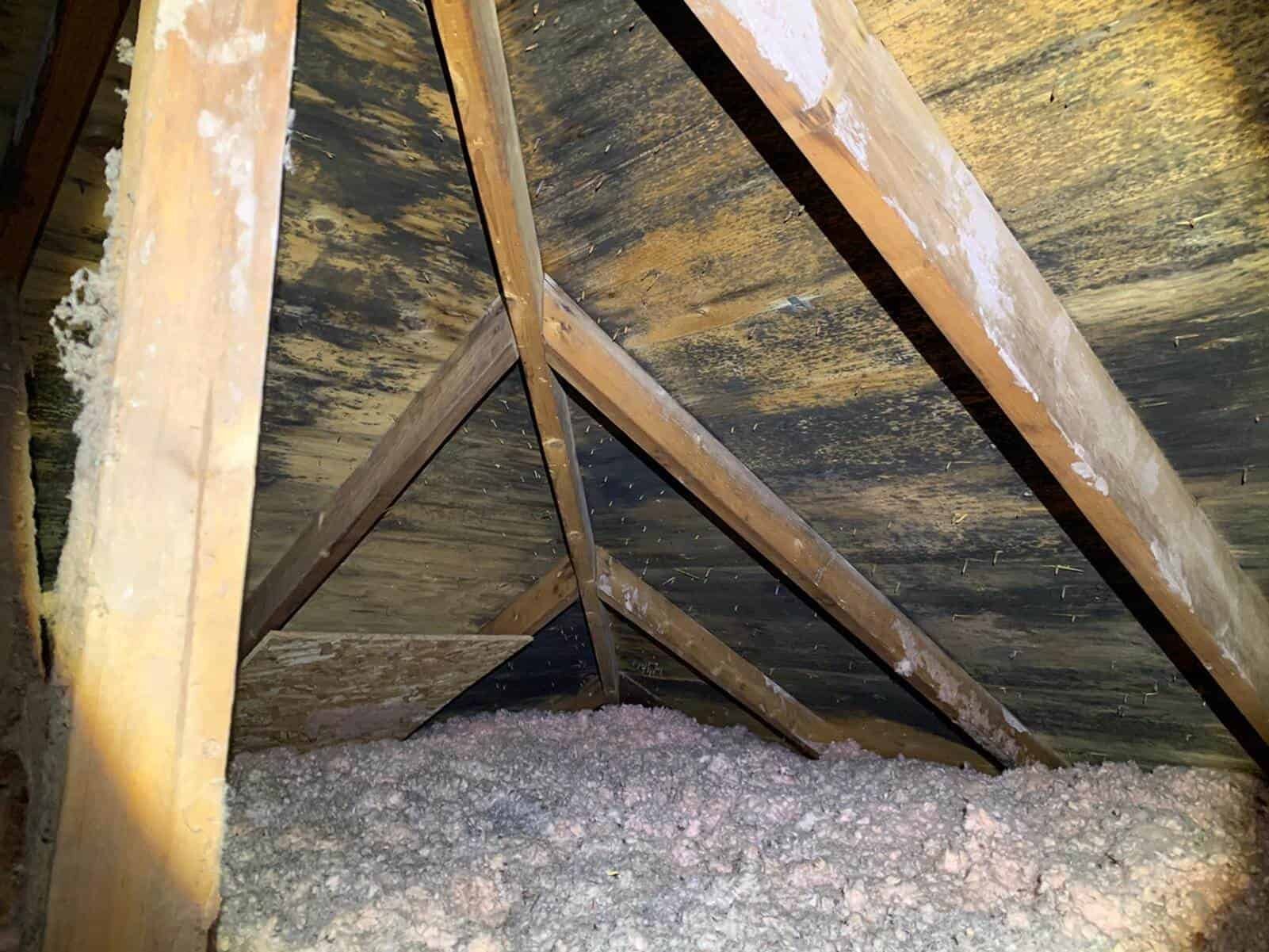Mold is one of those scary buzzwords for homeowners. It is one of the most common issues that Dallas property owners face, especially when humidity levels rise between May and September. A building with mold spores can pose a risk to occupants, particularly in terms of air quality and structural integrity.
The problem with mold growth is that it often occurs in areas that are difficult to access, such as attics and crawl spaces. As a result, many homeowners may not realize they have a mold problem, or they may be aware of the issue but are unable to take action to rectify it.
These unique challenges could make it difficult to sell a Dallas house with mold issues. In this guide, we will discuss the seriousness of mold exposure and provide some practical solutions for selling a home with a mold problem.
Table of Contents
- Why Attic and Crawl Space Mold Growth is a Serious Concern for Dallas Homeowners
- Challenges in Addressing Mold Issues Before Selling Your Dallas Home
- Selling a House with Mold in the Crawl Space or Attic As Is in Dallas
- Our Process for Buying Dallas Homes with Known Mold Growth or Damage
- Get a Fair Offer for Your Dallas House, Even with Attic or Crawl Space Mold Issues
Why Attic and Crawl Space Mold Growth is a Serious Concern for Dallas Homeowners
Mold is a unique substance because it requires certain ingredients for growth. Some of the most mold-friendly environments are dark, moist, and laden with organic materials.
Unfortunately, that also describes the typical crawl space or attic in a Dallas house. Water leaks under slab foundations, which are common in Dallas homes, are not always immediately noticeable. Mold growth can often go undetected for extended periods in these areas, leading to structural damage and concerns about indoor air quality.
Prioritizing the safety of building occupants is essential when dealing with mold spores. Prolonged mold exposure can pose severe health risks, including respiratory issues, infections, and asthma. The longer mold grows in your attic or crawl space, the greater the danger it poses to your respiratory system.
Additionally, your home may experience structural damage due to the water damage that accompanies mold, which can permeate porous materials like wood.
Identifying Hidden Mold Growth in Your Attic or Crawl Space
Whether you are planning to sell your Dallas house soon or not, mold remediation is essential to prevent potential health risks and structural issues. You must be vigilant for the signs of mold growth in your home, which may include visible water stains on ceilings, sagging walls, spotting, increasing respiratory health problems, and musty odors.
Additionally, it is a good idea to start inspecting your attic and crawl spaces regularly. Bring a flashlight into these areas once or twice a year, especially during a particularly rainy season, to look for mold growth.
The Impact of Attic & Crawl Space Mold on Air Quality and Health
Air quality is an important component of homeownership. Not only are there local building codes in Dallas that enforce certain standards for air quality, but you should strive to protect your loved ones and friends from harmful mold spores.
When you inhale these spores over a prolonged period, you may experience minor symptoms, such as a runny nose or itchy eyes. However, respiratory issues can grow worse the longer the mold is present, eventually leading to asthma, infections, allergic reactions, compromised immune systems, or other life-threatening diseases.
Even if the mold is located in a secluded attic or crawl space, the spores can eventually make their way into the living areas of the home.
Challenges in Addressing Mold Issues Before Selling Your Dallas Home
Now let’s broach the topic of selling a house with a mold problem. Homeowners who plan to sell their homes must put in work to make their properties as appealing as possible. The Dallas real estate market is highly competitive, so there is no guarantee that you will sell your house for a great price, even when it is in excellent condition.
Excess moisture and mold growth can further complicate an already challenging process. When potential buyers learn that there is mold in your attic or crawl space, they may decide to look elsewhere for a new home. Most buyers want move-in-ready homes with few maintenance issues because they don’t want to spend even more money on repair work.
Therefore, if you discover a mold problem in your home before selling, you must take action.
The Importance of a Professional Mold Inspection When Mold is Found
The presence of mold is typically indicative of a more significant underlying issue. Moisture levels in a house directly contribute to the spread of these volatile organic compounds, so finding the source of that water is essential to eliminate the mold issue.
Unfortunately, most homeowners are not mold experts, so they may see the mold return if they clean the visible mold growth but fail to address the root cause.
This is why a professional mold inspection is critical in your mold remediation efforts. When you call a professional mold removal service, they will inspect the property using their expertise and specialized equipment to find all the mold and its water source.
If there is enough moisture in a crawl space or attic for mold to develop, then a repair is likely needed to cut off the water source, whether it is a leaking roof or a broken water heater.
The professional inspection will reveal the full extent of the mold issue, including the type of mold and the necessary process to eliminate the problem.
The Cost and Complexity of Attic or Crawl Space Mold Remediation
Although a mold remediation specialist may be needed to make your home safer, their services can be incredibly expensive. Since the mold is in a confined and hard-to-reach space, it may take longer to clean up using specialized tools.
As a result, the contractor will likely charge a higher fee. Additionally, the process will take a considerable amount of time, potentially delaying your selling timeline. If the mold or moisture has affected structural components in the home, you will also need to consider the cost of replacements.
Mold remediation is a complex process that can be incredibly disruptive to your life in the house. Unfortunately, it may be a necessary pain you must endure if you want to sell the house on the open market.
Disclosure Requirements for Mold Found in Dallas Homes
Some homeowners may decide their mold problem is minor enough to ignore before a sale.
However, Texas state laws require sellers to disclose all known material defects to buyers before real estate transactions can be finalized, particularly those that could impact health or market value. That issue will be discovered one way or another, which could lead to a cancelled sale or even a lawsuit if the house with mold is purchased and you fail to disclose it to the buyer.
The seller’s disclosure notice is a legal document that is involved in a real estate transaction in Texas. You must complete this form and disclose the presence of mold to ensure the buyer is aware of what they are purchasing with their money.
Even if the buyer is willing to buy a house with mold concerns for a lower sale price, their lender may not be, so the sale could still fall through despite fulfilling the disclosure requirement.
Selling a House with Mold in the Crawl Space or Attic As Is in Dallas
If a mold problem exists in the attic or crawl space and you are not willing to invest in remediation, then your only other option is to sell the house as is. This route can work if you disclose the affected area to the buyer and they agree to proceed with the purchase; however, you will likely encounter more difficulty finding a buyer and securing a fair deal.
Some buyers are better equipped to purchase homes with mold damage than traditional buyers. Often, these entities are real estate investors who have the expertise and equipment to make repairs themselves.
You could sell your house to these cash home buyers even if there is a significant mold infestation. Selling as is may be a preferable alternative if you want to avoid the expensive and time-consuming aspects of mold remediation.
Direct cash sales are also much more efficient, so you can offload your Dallas house in 14 days or less.
Benefits of a Cash Offer for a Dallas House with Extensive Mold Damage
A-List Properties is a reputable cash home buyer in Texas. At our firm, we have experience purchasing properties with mold infestation problems, allowing sellers to avoid significant stress when attempting to sell on the open market. Disclosing mold damage to a potential buyer in a traditional sale is often enough to deter a buyer.
When you request a cash offer from A-List Properties, the extent of the mold issue is irrelevant. We are willing to handle the remediation steps ourselves once we have bought the property. As a result, you can receive your money from the sale without worrying about buyers who back out, lengthy price negotiations, or failed home inspection reports.
We take properties in all conditions and can close in as little as 7 days, helping you save money on mold repairs, real estate agent commissions, and closing costs.
Our Process for Buying Dallas Homes with Known Mold Growth or Damage
As fellow Texans, we at A-List Properties believe in a fair and honest process. Our goal is to help you find a solution that works, not just buy a house from a seller who is desperate. If a traditional sale meets your needs more effectively, we will let you know.
We buy houses in Dallas and can provide a fair evaluation of your home based on its location, condition, and market value.
If you have potential hazards related to mold in your home, we are still willing to buy it with no financing delays. Our simple process takes just three steps:
- Contact A-List Properties and provide property details, including mold damage
- Schedule a walkthrough so we can visit the house in person
- Receive a fair cash offer and choose a closing date that fits your timeline
What Information Do We Need About Your House with Mold?
Our simplified process becomes even easier if you provide lots of information about the property upfront. Some of the most important details you can give us include the property’s address, condition, square footage, number of rooms, and age.
You should also inform us of everything you know about the extent of the mold growth, including the areas it is affecting and the impact it is having on the building components.
If a mold inspection was conducted on the property, you should send us the report. The more information you give us upfront, the easier it will be for the team to schedule a quick walkthrough and make an offer.
Do not be concerned about your cash offer if we find mold in other locations during the walkthrough. A-List Properties will buy homes in all conditions, including those with widespread infestations of black mold.
Mold thrives in dark, damp areas that are often hard to reach, so it is not surprising to discover a larger infestation during the walkthrough. Nonetheless, it will not affect our willingness to make an offer.
Get a Fair Offer for Your Dallas House, Even with Attic or Crawl Space Mold Issues
The challenge of selling a house with a mold-related issue can make the real estate process extremely stressful. You may struggle to find buyers once you legally disclose the nature of the mold damage. If there is potential mold in your attic or crawl space, it could be enough of an issue to deter many buyers.
A-List Properties can be the solution you need when selling a Dallas house with mold concerns. You can resolve the mold problem quickly by passing it on to us once the sale is completed. We will happily take on the burden.
Contact us today at 972-526-7042 or complete the online form to request your no-obligation cash offer.

Zach Shelley
Zach Shelley is a seasoned real estate investor with a diverse network spanning across the nation. As the founder of his own real estate venture, Zach is committed to offering innovative solutions to homeowners facing various real estate challenges.. Through his dedication and strategic approach, Zach continues to make a significant impact in the real estate industry, providing homeowners with alternative pathways to navigate their property transactions.



